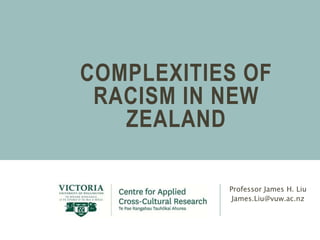Complexities of Racism in New Zealand
- 1. COMPLEXITIES OF RACISM IN NEW ZEALAND Professor James H. Liu James.Liu@vuw.ac.nz
- 2. NEW ZEALAND: AN OPEN SOCIETY IN PRINCIPLE Unlike many European nations, NZ visions itself as a nation of migrants, whether these are tangata whenua who arrived centuries ago, or more recent settlers. Uniquely in the world, both LIBERAL & BICULTURAL models of NZ nationhood CO-EXIST. The expression of racism in New Zealand is limited by these two ideals.
- 3. 100 90 80 70 60 50 40 30 20 10 0 NZ Oz Sw Sp Nl Fr Lx UK Dn Fn It Pt Ir Bl Ge Aus Gr Countries Percentage Agreement IT IS A GOOD THING FOR ANY SOCIETY TO BE MADE UP OF PEOPLE FROM DIFFERENT RACES, RELIGIONS AND CULTURES
- 4. NATIONAL CHARACTER BASED ON LIBERAL DEMOCRATIC VALUES Friendly & approachable Have a ŌĆśclean & greenŌĆÖ attitude Be friendly Be a hard worker Respect other cultures & ethnic groups Appreciate nature and the outdoors Be environmentally friendly Support a nuclear-free New Zealand Egalitarian ŌĆō believe in equality Try to get ahead on own efforts Treat all people of all races equally Be innovative & creative Be tolerant of other cultures
- 5. MIGRANTSŌĆÖ EXPERIENCES OF DISCRIMINATION 45 40 35 30 25 20 15 10 5 0 Percent By region of origin ŌĆō Specific Prejudices http://dol.govt.nz/publications/research/lisnz/
- 6. WARMTH RATINGS OF NEW ZEALAND EUROPEAN, M─ĆORI, PACIFIC AND ASIAN PEOPLES TOWARD ONE ANOTHER: NZ EUROPEANS AT THE HEART OF THE NATION
- 8. HISTORICAL BASIS FOR BICULTURALISM The basis for biculturalism arises out of the status of M─üori as tangata whenua in what is widely regarded as the foundational document of NZ sovereignty, the Treaty of Waitangi. This contractual relationship between M─üori and the Crown has evolved over time, but includes provisions for kawanatanga, rangatiratanga, equality for all citizens, reasonable cooperation between Crown and iwi, and redress of past injustices. These principles are specific to NZ (whereas liberalism is in theory universal).
- 9. HOW WELL HAVE MAORI & PAKEHA/ EUROPEANS HONOURED THE TREATY OF WAITANGI? 6 5 4 3 2 1 0 Maori Pakeha Respondent Ethnicity Mean Rating Maori Honour Pakeha Honour 6 5 4 3 2 1 0 Maori Pakeha Respondent Ethnicity Mean Rating Maori Honour Pakeha Honour Student Sample General Sample
- 10. SYMBOLIC ELEMENTS OF THIS RELATIONSHIP ARE WIDELY ACCEPTED ACCORDING TO RESEARCH USING THE IMPLICIT ASSOCIATIONS TEST (IAT)
- 11. AT THE SYMBOLIC LEVEL (IAT), MAORI AND PAKEHA ARE BOTH IMPLICITLY ASSOCIATED WITH THE NATIONAL IDENTITY
- 12. NEW ZEALAND COAT OF ARMS: SYMBOLICALLY BICULTURAL
- 13. BUT IF THE NATIONAL IS SO EQUAL WHY IS IT THAT ŌĆ”. ’āśMaori form 16% of the total population and 50% of the prison population? ’āśMaori die 8 years younger than everyone else? ’āśMany Maori attend high schools where no one is going to university? ’āśMaori earn 16% less income than the rest?
- 14. SUPPORT FOR BICULTURALISM IN PRINCIPLE, OR SYMBOLIC INCLUSION OF MAORI (4.89/1-7) ’āśMaori language should be taught in all NZ schools ’āśThe NZ national anthem should be sung in both Maori and English. ’āśNZ should be known and seen as a bicultural society, reflecting an equal partnership between Maori and Pakeha. ’āśIf NZ were to change to a republic, then the Treaty of Waitangi should be used as a foundation for our constitution. ’āśNZ should embrace itŌĆÖs cultural diversity.
- 15. MORE SUPPORT FOR LIBERAL DEMOCRATIC PRINCIPLE OF EQUALITY & OPPOSITION TO RESOURCE SPECIFIC BICULTURALISM (5.73) ’āśWe are all New Zealanders, and no one ethnic group should get special privileges. ’āśIt is racist to give one ethnic group special privileges, even if they are a minority ’āśI feel that although Maori have had it rough in past years, they should still be treated the same as everyone else. ’āśNo one group should be given privileges on the basis of ethnic or racial background ’āśI find the idea of giving priority or special privileges to one group appalling, minority or otherwise
- 16. HISTORICAL NEGATION AS A LEGITIMIZING MYTH FOR NEW ZEALAND EUROPEANS The Historical Negation Scale Loading Grievances for past injustices should be recognized and due compensation offered to the descendants of those who suffered from such injustices. (r) .86 New Zealand law needs to recognize that certain ethnic minorities have been treated unfairly in the past. People belonging to those groups should be entitled to certain benefits and compensation. (r) .84 I believe that I should take part in the efforts to help repair the damage to others caused by earlier generations of people from my ethnic group. (r) .83 We as a nation have a responsibility that see that due settlement is offered to Maori in compensation for past injustices. (r) .82 We should not have to pay for the mistakes of our ancestors. .81 We should all move on as one nation and forget about past differences and .79 conflicts between ethnic groups. It is true that many things happened to Maori people in the past that should not have happened, but it is unfair to hold current generations of Pakeha/NZ Europeans accountable for things that happened so long ago. .78 People who weren't around in previous centuries should not feel accountable for the actions of their ancestors. .69 (r) = Item is reverse scored.
- 17. MAYBE NOT RACIST (NOT BASED ON INTERPERSONAL DISLIKE), BUT IT DOES MAINTAIN NZ EUROPEAN PRIVILEGE THROUGH POLICY PREFERENCES & INSTITUTIONAL NORMS FAVOURING THE MAJORITY
- 18. WARMTH TOWARDS MAORI National Sample Negative feelings distributed unequally
- 19. CONCLUSION NZ is open in principle, but prejudiced in practice in specific situations, in places, and against particular types of people. NZ national identity is constructed from both Liberal Democratic and Bicultural Principles. The future trajectory of the nation will have to draw from these two principles together, to reduce prejudice and discrimination across the different parts of the nation.



















